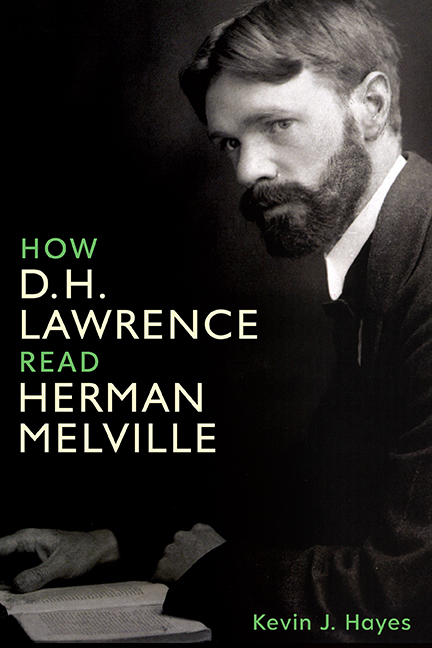Book contents
- Frontmatter
- Dedication
- Contents
- Acknowledgments
- Preface
- List of Abbreviations
- Introduction
- 1 An English Midlands Bookshelf
- 2 An Archway into the Future
- 3 Everyman and the Dead Narrator
- 4 How Moby-Dick Shaped Women in Love
- 5 A Little Hesperides of the Soul and Body
- 6 The Symbolistic All-Knowledge
- 7 The Melville Centenary
- 8 Typee under Etna
- 9 Two Days in Tahiti
- 10 The Voyage Home
- Index
7 - The Melville Centenary
Published online by Cambridge University Press: 26 May 2022
- Frontmatter
- Dedication
- Contents
- Acknowledgments
- Preface
- List of Abbreviations
- Introduction
- 1 An English Midlands Bookshelf
- 2 An Archway into the Future
- 3 Everyman and the Dead Narrator
- 4 How Moby-Dick Shaped Women in Love
- 5 A Little Hesperides of the Soul and Body
- 6 The Symbolistic All-Knowledge
- 7 The Melville Centenary
- 8 Typee under Etna
- 9 Two Days in Tahiti
- 10 The Voyage Home
- Index
Summary
In deciding not to publish Lawrence's Melville essay, Austin Harrison may have made his single worst decision as editor of English Review. Since he truncated the serial version of “Studies in Classic American Literature” after “The Two Principles,” contemporary readers never got to read the first version of Lawrence's Melville essay. Had it been published in English Review, the essay could have accelerated the interest in Melville's work that was slowly building.
Readers in 1919 were ready to learn more about Melville. A notice of the June English Review in the Aberdeen Daily Journal, for example, briefly discusses “The Two Principles”: “Mr. D. H. Lawrence continues his study of ‘Classic American Literature,’ taking the books of the sea as his theme, but instead of analysing the novels of such writers as Dana and Herman Melville, he evolves a somewhat belaboured philosophy of the relation between the sea and the human psyche.” Reading the names Dana and Melville in the article's opening sentence, this commentator looked forward to learning more about these two American authors and was consequently disappointed with the remainder of the essay. Clearly, this Aberdonian reader would have much preferred an analysis of Melville's fiction over the convoluted cosmology of “The Two Principles.”
This notice of English Review in the Aberdeen Daily Journal is not the only indication that its editors and readers wished to know more about Melville. Two months earlier, the paper had published an article titled “Lure of the Tropical Island in Literature.” Its author remarked: “I ask myself for the hundredth time, why it is that the idea of a tropic island set in the Southern seas should appeal to so many people and to so many different temperaments.” Without analyzing the tropical impulse, the author admitted: “The magic is there, explain it how you will. Herman Melville endeavoured to elucidate it in the eloquent lines on the Pacific.” This admission leads into an excerpt from Moby-Dick in which more than half of “The Pacific,” a soul-stirring chapter, is quoted.
The Aberdonian interest in Melville was not unique. Across Great Britain readers anticipated the Melville revival. Once the Great War ended in November 1918, conditions were ripe for the revival. Understandably, people felt a huge sense of relief with the war's end.
- Type
- Chapter
- Information
- How D. H. Lawrence Read Herman Melville , pp. 111 - 126Publisher: Boydell & BrewerPrint publication year: 2021



